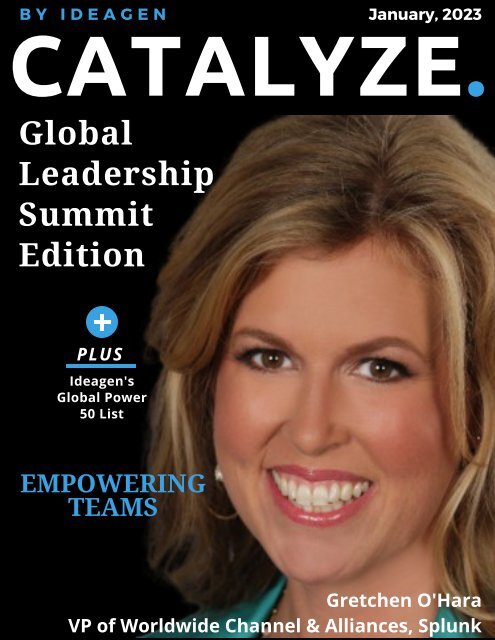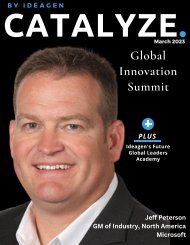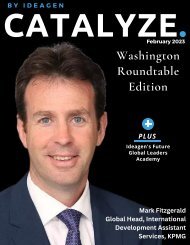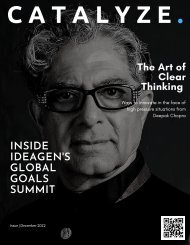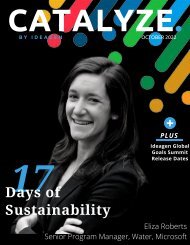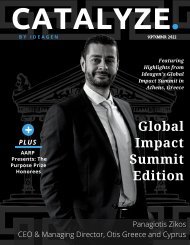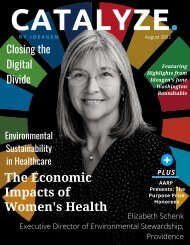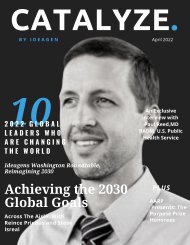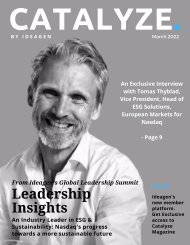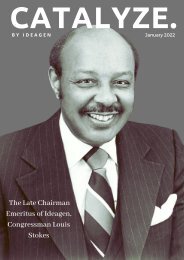Ideagen Global - Catalyze Magazine, January 2023
With Ideagen's extensive member network and influential platform, Catalyze Magazine serves as an aggregate for all the content, events, articles, and collaboration that we do. It is a monthly magazine where you will find transcriptions from Ideagen events, content, articles, and information surrounding how we are completing our mission. With this magazine, we want to highlight the nature of cross-sector collaboration and how we infuse it into our daily mission on a global scale. Ideagen's monthly Catalyze Magazine is back in 2023 with our January edition. Inside, view conversations from our Global Leadership Summit, dedicated to the late friend of Ideagen, Steven J Tingus. This months covers features speakers from the 2023 Global Leadership Summit: Gretchen O'Hara, Dr. Sanjay Rishi, Graham Macmillan, Amir Dossal, Kevin Donnellan, Jean Accius, and Kristen Hicks.
With Ideagen's extensive member network and influential platform, Catalyze Magazine serves as an aggregate for all the content, events, articles, and collaboration that we do. It is a monthly magazine where you will find transcriptions from Ideagen events, content, articles, and information surrounding how we are completing our mission. With this magazine, we want to highlight the nature of cross-sector collaboration and how we infuse it into our daily mission on a global scale.
Ideagen's monthly Catalyze Magazine is back in 2023 with our January edition. Inside, view conversations from our Global Leadership Summit, dedicated to the late friend of Ideagen, Steven J Tingus.
This months covers features speakers from the 2023 Global Leadership Summit: Gretchen O'Hara, Dr. Sanjay Rishi, Graham Macmillan, Amir Dossal, Kevin Donnellan, Jean Accius, and Kristen Hicks.
You also want an ePaper? Increase the reach of your titles
YUMPU automatically turns print PDFs into web optimized ePapers that Google loves.
B Y I D E A G E N
January, 2023
CATALYZE.
Global
Leadership
Summit
Edition
PLUS
Ideagen's
Global Power
50 List
EMPOWERING
TEAMS
Gretchen O'Hara
VP of Worldwide Channel & Alliances, Splunk
B Y I D E A G E N
January, 2023
CATALYZE.
Global
Leadership
Summit
Edition
PLUS
Ideagen's
Global Power
50 List
WORK OF
THE FUTURE
Dr. Sanjay Rishi
CEO, JLL Work Dyanamics, Americas
B Y I D E A G E N
January, 2023
CATALYZE.
Global
Leadership
Summit
Edition
PLUS
Ideagen's
Global Power
50 List
ENABLING
OUR
PARTNERS
Graham Macmillan
President, Visa Foundation
B Y I D E A G E N
January, 2023
CATALYZE.
Global
Leadership
Summit
Edition
PLUS
Ideagen's
Global Power
50 List
IMPORTANCE
OF A GLOBAL
MINDSET
Amir Dossal
President, Global Partnerships Forum
B Y I D E A G E N
January, 2023
Kevin Donnellan
Executive Vice President & Chief of Staff, AARP
CATALYZE.
Global
Leadership
Summit
Edition
PLUS
Ideagen's
Global Power
50 List
LEADING THE
PURPOSE PRIZE
B Y I D E A G E N
January, 2023
CATALYZE.
Global
Leadership
Summit
Edition
PLUS
Ideagen's
Global Power
50 List
METRICS IN
CAREGIVING
Jean Accius
Senior Director of Global Thought Leadership, AARP
B Y I D E A G E N
January, 2023
CATALYZE.
Global
Leadership
Summit
Edition
PLUS
Ideagen's
Global Power
50 List
DATA
GOLDRUSH IN
RETAIL
Kristen Hicks
Director of Product Marketing, Microsoft Cloud for Retail
F R O M G R E T C H E N O ' H A R A , S P L U N K ' S
C H A N N E L C H I E F , V I C E P R E S I D E N T
W O R L D W I D E C H A N N E L S & A L L I A N C E S
George Sifakis:
How do you empower your team
to grow and achieve the United
Nations Sustainable Development
goals?
Gretchen O'Hara
Yeah. I think the first thing is
understanding the talent and
superpowers of every individual. I
think I really believe in the power
of people and that everybody has
a unique skill or capability to
bring to the table.
When you can find that strength
and tap into that person's
potential, great things happen. I
think sometimes we put people in
the wrong thing, the wrong place.
How do we optimize the right size
and power to get everybody to do
their best work? That's tapping
into everyone's best talent.
I encourage everyone to never have
this mantra of, I've done it before or,
I know how to do it. Being openminded
with open questions and
having that growth mindset really
sets you up for ongoing
transformation change and
opportunity ahead. Then, once you
have the people and you have, I
would say, the team environment of
a learn it all culture, then it's about
how you achieve your company's
goals.
And that's painting a vision of
ambitious, but achievable goals,
then creating a roadmap and
connecting the dots to how you're
going to get there.
CATALYZE MAGAZINE | 2
LEADING UP
AARP'S PURPOSE
PRIZE
KEVIN DONNELLAN; AARP EXECUTIVE VICE PRESIDENT AND
CHIEF OF STAFF
Kevin Donnellan:
Purpose Prize is the only national award that celebrates people 50 and older who are
using their lived experiences to make a difference in the world. Through the Purpose
Prize award, AARP celebrates the creativity, innovation, and inspiration that lived
experience brings. There are five winners per year, and they are typically founders of
nonprofit organizations. When they win, they receive a number of things, including a
$50,000 cash prize for their organization. And then we also give them access to several
organizational supports, from leadership coaching to succession planning, media
branding, development of an evaluation plan, and all-around board support. All that
broadens their organizational impact. The Purpose Prize fits beautifully into AARP's
mission and the value of celebrating the achievements of people 50 plus.
George Sifakis:
Obviously, that's directly in line with the mission of AARP, so is it necessary that a
Purpose Prize honoree work on an issue that AARP works on, such as age discrimination
or retirement?
Kevin Donnellan:
No, they don't have to. It'd be great, and every once in a while, one of the winners
focuses on one of our key strategic priorities, but you do not need to. What we celebrate
with the Purpose Prize are people who are using innovative approaches to making
significant change no matter the issue they're working on. It's about their legacy and the
power of their work.
CATALYZE MAGAZINE | 3
LEADING UP AARP'S PURPOSE PRIZE
CONTINUED...
George Sifakis
That's truly what's so transformational about it. And so, the founders of nonprofits are eligible to
receive this purpose Prize, and winners must be over 50, and they must have been over 40 when
they founded the organization. Are nonprofits the only eligible entities?
Kevin Donnellan
Exactly.
George Sifakis
Excellent. And you've been doing the Purpose Prize now and leading it up at AARP for six years; it
seems like yesterday when we had the privilege of attending an in-person purpose prize event. Do
the honorees have anything in common beyond meeting these basic criteria?
Kevin Donnellan:
They do; I would say tenacity is probably the thing most of them have in common. All of our
honorees at some point saw a problem and then they went after it to fix it. Most of them also have
a very personal connection to the work. For example, we had a nonprofit leader who became
paralyzed in a skiing accident. She then went on to Spain to found an organization that provides
specially adapted wheelchairs that allow people with disabilities to enjoy outdoor activities. It’s all
of the folks involved like this that really made the purpose prize so special.
2023 Purpose Prize Winners
Global Leadership Summit
Now Streaming on Ideagen TV
"That role (Annalise Keating) absolutely defined my
career only because of the role that, a woman who
looked like me who would not necessarily be
considered for that role. She was cool... she's a
leading lady on network television" -Viola Davis
CATALYZE MAGAZINE | 5
Excerpts from Ideagen's Interview
with Viola Davis, Julius Tennon,
and Steven Tingus
Steven Tingus: Tell me your feelings about the underrepresentation situation
[in Hollywood], and what you would like to see changed, to not really just talk
about diversity inclusion. That's all nice, but I'm very strategic in my work.
What would you like to see done right now?
Julius Tennon: Well, obviously, you know, it's always one of those things
where you have to be the change you want to see. And Steve, I’ve known you
for these last six years, and I know that those stats about, actors who are
disabled are true. And I think you have to; we have, to continue to have those
conversations with the people who run the studios, also with independent
producers, and make them more sensitive to the fact that if we can have
someone with a disability do the work that actor should be given the job
because, you know, if you're going to have somebody who's disabled do that
job and have that disability, they actually have to be able to perform. So that
worry of a producer, if you get an actual disabled person, you're not going to
be able to do the job well, we have to dispel that. Being able to put people in
front of them who could actually do the job who could actually write a script,
could be pulling cohorts and doing different things. Because just because
they're disabled doesn't mean that they don't have the ability and aren't able to
do it. So I just think we have to start having these real serious conversations
with the folks at the top and talk about these things and say, let's make a
roadway, let's build a real roadway instead of talking about it. Let's really do it
in a substantive way.
CATALYZE MAGAZINE | 6
WORK IS NO LONGER WHERE
YOU GO ITS WHAT YOU DO
CATALYZE MAGAZINE | 7
DR. SANJAY RISHI
CHIEF EXECUTIVE OFFICER JLL
WORK DYNAMICS - AMERICAS
George Sifakis
In your participation at the Ideagen Global Goal Summit at the United Nations, you stated
at one point, 'work is no longer where you go, work is what you do.' Sanjay, how has
leadership had to adapt to this new hybrid work environment?
Dr. Rishi
Yeah, leadership definitely went through some challenges. Didn't we all, George, in terms
of how I get adjusted to the idea of being at home and cohabitating in a space with
others that might be working?
If you think about it from a leadership standpoint in this, where work is what we do.” It
isn't where we go historically. We've all said I am going to work or, I've come back from
work. This new hybrid world doesn't allow you to disconnect as easily, and the workplace
extends beyond the four physical walls of your office or the building that you work in.
The workplace now goes into your study, and into your bedroom, and your living room. So
with that, there's a whole new cadre of leaders thinking about technology, ergonomics,
sustainability, and equity that extends beyond the original definition of a workplace.
That's essentially what I focus my work on, taking those experiences of working from
home or at a workplace and making them seamless regardless of whether you're working
from a cafeteria or an airport lounge or from an office or home.
IMPORTANCE OF A
GLOBAL MINDSET
AMIR DOSSAL- PRESIDENT, GLOBAL
PARTNERSHIPS FORUM, DISTINGUISHED
FELLOW, HEALTH AND HEALTHCARE, WORLD
ECONOMIC FORUM
Amir Dossal:
I want to focus for a moment on
people like Paul Polman, former
CEO of Unilever. What he tried to
do was, build the DNA of the
company around the SDGs. So
any product developed and
supplied or any services they
provide is based on the concept
that we must be SDG driven,
compassionately driven, and
driven for results.
It is not always easy, because
obviously, not all companies lend
themselves to that kind of
concept. But I would say, perhaps
barring a few sectors, you can
apply that of anything. Whether it
is a foundry, it's a manufacturing
concern, it's a supply chain, it's
provided a provision of goods or
services, we can integrate the
sustainability concept quite
comfortably without losing focus.
On the bottom line,
understandably, companies
have a responsibility to the
shareholders first. So to deliver
well for the shareholders means
caring for the community. And
by caring for the community,
you increase your business
outreach. And when you
increase the outreach, you'll
improve your bottom line.
CATALYZE MAGAZINE | 8
IMPORTANCE OF A GLOBAL
MINDSET
George Sifakis:
Here we are in 2023 looking at that 7-year span to 2030, we are now at what
someone referred to the other day in an interview at the midterm. what is the
update that you can bring us on progress in helping achieve the global goals?
Amir Dossal:
George, you put it right. We are at the midterm mark, and I'm sorry to tell you that
it might be a little gloomy. We are woefully behind on the SDGs when we
launched them in 2015.
Calculations in 2015 were saying that in order to achieve these 17 goals and 169
targets, we needed about two and a half trillion worth of investments. Well, COVID
happened, and guess what? We are now set back well before 2015. Today, the UN
has calculated that the figure is between five and 7 trillion dollars worth of
investments
Now that's not easy, especially when we've not been able to achieve the original
target of two and a half trillion. Nevertheless, I am very confident in the fact that
the Secretary General of the United Nations, António Guterres is attached as the
architect of those goals.
He has been leading a campaign to mobilize within the UN community on how to
accelerate progress. But more importantly, he's said, we need to bring the private
sector into this process. We need financiers to demonstrate the value proposition
of investing in these goals. Otherwise, regrettably, we'll be struggling for many
years to come.
CATALYZE MAGAZINE | 9
G L O B A L
Excerpts from
Graham
Macmillan
President at Visa
Foundation
Graham Macmillan
Before I speak to 2023, I want to give you a story of our journey and how
we got here. When Visa Foundation was created about six and a half years
ago, we were capitalized with about 400 million in assets, which is, as you
can appreciate, somewhat unusual for corporate foundations. But what it
really gave us is an opportunity to do two things. One is, to think long-term
and plan long-term; but also to partner through grant-making in long-term
relationships.
It also allows us to invest in art and endowment to further our mission.
And so, in the early days of our journey, we were rarely able to put
together a strategy that incorporated both grant-making, as well as impact
investing, to advance our focus on supporting small micro businesses
around the world.
And so the approach that we take is really an integrated approach. It really
utilizes both those tools to support partners that are directly interacting
with the small micro businesses that we care about. About three years ago,
we made a commitment as part of a signature, program that we call
Equitable.
CATALYZE MAGAZINE | 10
E X C E R P T S F R O M G R A H A M M A C M I L L A N
P R E S I D E N T A T V I S A F O U N D A T I O N
Equitable was a 200,000,000 5-year commitment to enable 140 million dollars of private
market impact investments alongside about 60 million dollars of grant-making to support
the development and growth of more diverse small businesses. And what we've learned
along the way is the tremendous demand for capital, of course, and I know you can
appreciate that, but it's more than just the capital that's needed by these small businesses.
It's really enabling the partners that deploy that capital, whether they be grants or
investments, to look at communities that have historically been missed, which is to say,
gender, and underrepresented communities.
To give you an example, in the United States, there are roughly 70 trillion dollars of
wealth and financial assets, and only 1 to 3% of that capital is controlled by women or
underrepresented communities. We know that as investors and other partners put money
into communities, they do so in communities they understand. And so our objective now,
and that it has really been focusing and will really bring this to 2023 and beyond, is to
continue to deploy a hundred percent of ours into funds and other intermediaries that are
controlled by the communities that we are focused on. So that is to say gender diverse
fund investors. And to date, we've done about 125 million in private market investments
across asset classes, which is to say, venture capital, private equity, and private debt.
We have all the tools necessary to meet particular needs and circumstances. And where we
can, we also deploy grant resources to support that work, so it gives us a pretty unique
value proposition. And for 2023, we anticipate deploying an additional 40 million of
investments, globally.
Because as I said before, we have a global footprint, and it will continue to be in funds that
represent communities that we care about. And it will be a mix of early first-time fund
managers, and some more established partners, as part of a prudent financial investment.
CATALYZE MAGAZINE | 11
Ideagen
Global
Power 50.
HIGHLIGHTING GLOBAL LEADERS
CHANGING THE WORLD
The Global Leaders Power 50 highlights individuals who demonstrate
leadership and vision, especially in their ability to use innovation to change
the world. This list is a qualitative list and not a ranking. While there are
countless factors to measure the impact of individuals and organizations,
the Global Leaders Power 50 focuses on an individual’s leadership
characteristics and impact. These individuals lead by example to shape
their organization's values and strive for global change guided by the UN
SDGs.
View the Full List on Ideagenglobal.com
METRICS IN
CAREGIVING WITH
AARP
By: Jean Accius
George Sifakis:
Let's talk about moments in care
caregiving. Caregiving is a critical
element of what you do at AARP,
and I'd love to hear from you. Why
is caregiving so vital for those that
need it at this moment in our
nation's history and globally?
Jean Accius:
We know that around the country,
people are aging and living longer.
In the US, we have over 48 million
family caregivers who provide care
each and every day. These are
daughters or sons who are caring
for a mom, dad, spousal partner,
neighbor, or friend. Usually, they're
really trying to do the best that they
can.
I will talk about this on two fronts.
One is the individual, and two is
societal, and they're both
interconnected. People don't wake
up saying, 'I'm a caregiver today.'
Typically, what tends to happen,
and you get to just kind of think
about this, even in your family
situation, you're taking your mom,
your dad, your spouse, your
partner, or a friend to the doctor's
office. And then over time, what
started off as a trip here and there
starts becoming every week.
Then you find yourself doing
things like helping with eating,
bathing, dressing, or in some
cases, particularly as the
illness or the condition
progress, doing very
complicated medical nursing
task like giving injections, tube
feedings, wound care, the
whole nine yards.
You're dealing with this
caregiving in an emotional,
physical, and even financial
way. Family caregivers spend
20% of their income out of
pocket caregiving, so that's
roughly about $7,000 a year,
depending on the condition and
depending on whether or not
the person actually lives with
you or near you. If you are
caregiving for someone in
another state, or even within
the state, but long distance,
you're looking at much higher
numbers. So obviously, there's
a huge emotional, physical,
and financial cost to caregiving.
60% of caregivers are working,
so they're trying to juggle their
caregiving responsibilities with
their work responsibilities.
It might come to a point where
they either have to call in sick, or in
some cases, leave the workforce
altogether, which means that their
own financial security is at risk,
and they're just looking for help.
Because particularly in the US
context, we don't have an
infrastructure in place to support
those caregivers who are providing
the care.
A lot of this is being done unpaid. If
you were to quantify that, it would
be roughly 470 billion a year. Well,
what are the implications, primarily
from an economic standpoint? We
at AARP did some work,
particularly with the global thought
leadership team, and what we
found was the fact that just
providing some financial support
like paid caregiving, for example,
would save the US economy 1.7
trillion by 2030. So, there's an
economic business case for this
because you're actually able to, in
many cases, keep people in the
workforce, while simultaneously
relieving the workforce's economic
pressures.
CATALYZE MAGAZINE | 12
DATA-THE NEW
GOLD RUSH IN
B y : K r i s t e n H i c k s , M a r k e t i n g L e a d
RETAIL
a t M i c r o s o f t
George Sifakis
Congrats on the Microsoft purchase of
GPT; I can't leave that out because
we're all learning more about it and
can't wait to utilize it. On that note,
Kristen, how do you elevate customer
capability through data and insights?
Kristen Hicks
Yes, and I share your excitement
because data is gold. We've known this
forever. Data is the key to knowing
your customers like never before.
Being able to serve their interests as
best as you can, and even being able to
provide recommendations that they
might not have even considered before,
and to delight them and grow loyalty.
Importantly, it also improves your
bottom line if you know how to use
data, right? So while data is there, the
problem that a lot of companies face is
that they're siloed. The data is across
multiple disparate systems across the
business. And frankly, data is nothing
unless you can connect the dots and
extract insights. So that's where cloud
for retail really comes in. It connects
the silo of data to improve a company's
operations insights in their bottom line.
So we're talking in retail about fewer
abandoned carts and more conversions
due to smart recommendations on
online shopping. Knowing your
customer, no matter if they're online, or
in-store, having a full personalized
omnichannel experience because a
company can now monitor trends and
patterns and place those insights into
action.
Cloud retail is also about maximizing
signals in the store with predictive
models and optimizing store layout,
inventory, and shelf placement. That's
all helpful for frontline staff and allows
the leaders to make easier decisions
across the shopper journey. The best
part I really like about this is the value
add that retailers can have to their
technical environment. They don't have
to throw every single way that they
already own. It is a perfect overlay, and
I love how cloud for retail meets the
customer wherever they are on their
digital journey. If you're just beginning
or if you want to focus on the supply
chain or empowering a store associate,
we can support you the entire way.
CATALYZE MAGAZINE | 13
Editor's Note
Dear Friends and Colleagues, We are already underway in this
new year with a fresh start in 2023, and there are numerous
positive trends and advancements to be optimistic about. From
breakthroughs in technology to inspiring advancements in
sustainability, it's an exciting time to be alive. We are seeing
communities come together in new ways with a renewed focus
on changing the world. The world continues to evolve, with ai
and virtual experiences becoming increasingly accessible and
diverse, including the latest from ChatGPT and OpenAI.
As we move forward into the year, it's important to celebrate
these advancements and continue to strive toward a brighter
future. At Catalyze Magazine by Ideagen Global, we are
thrilled to be a part of this positive movement and can't wait to
share all the exciting developments with our readers in 2023!
GEORGE SIFAKIS
GEORGE SIFAKIS
Editor-in-Chief & CEO
-Ideagen
CATALYZE MAGAZINE | 20
ALEXA SIFAKIS
Senior Editor
DANIEL KERNS
Publication Co-Editor
Pictured Top to Bottom
George Sifakis, Ideagen
Rawle Andrews, Jr. APAF
Nasdaq Board Times Square
In Memoriam
Steven James Tingus
